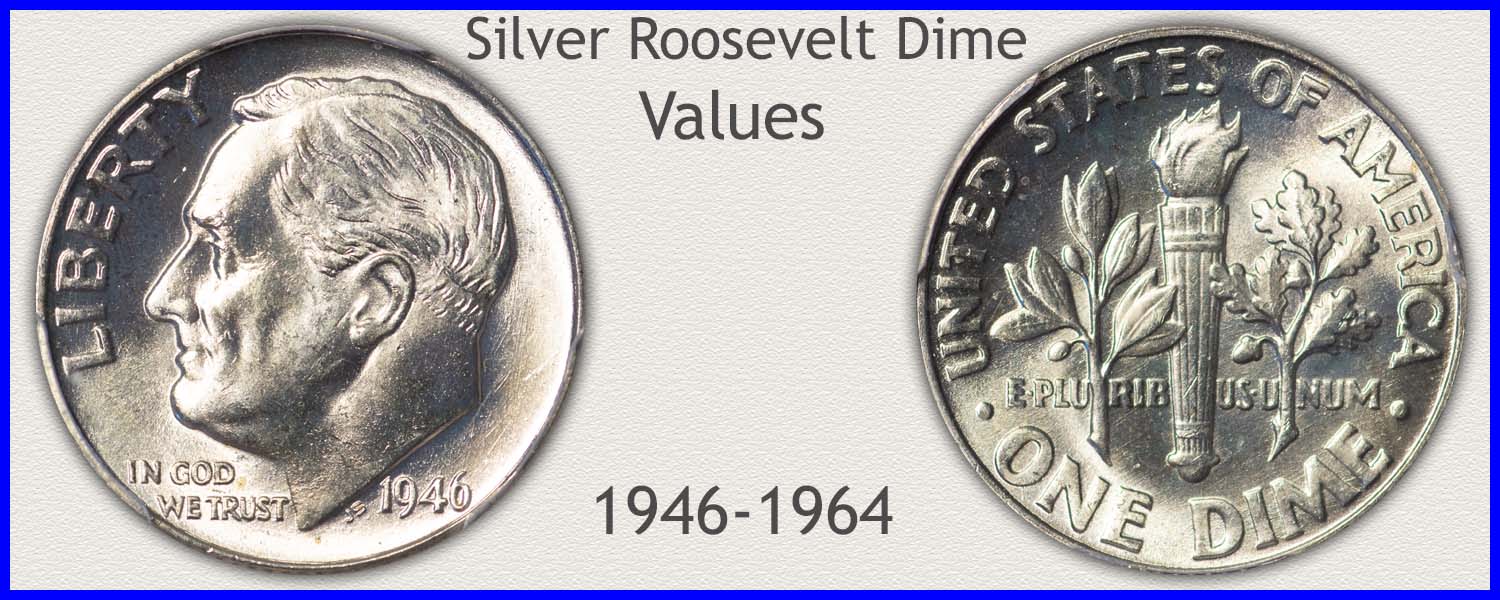Coin Values Moving with Precious Metals: Up-Dated 4/14/2025: Gold $3226 | Silver $31.88
1962 Dime Value
The early Roosevelt dimes were a 90% silver alloy. Because of its silver content 1962 dime value begins at $2.13 each. A historical time in U.S. history, vintage dimes are a popular collectible.
Collectors seek pleasing condition examples for their sets. A young collector finds the lightly circulated pieces affordable for a now old coin. An advanced set includes mint state examples of each date and mint variety. Following the steps below helps separate the base silver value dimes from the collectible premium ones.
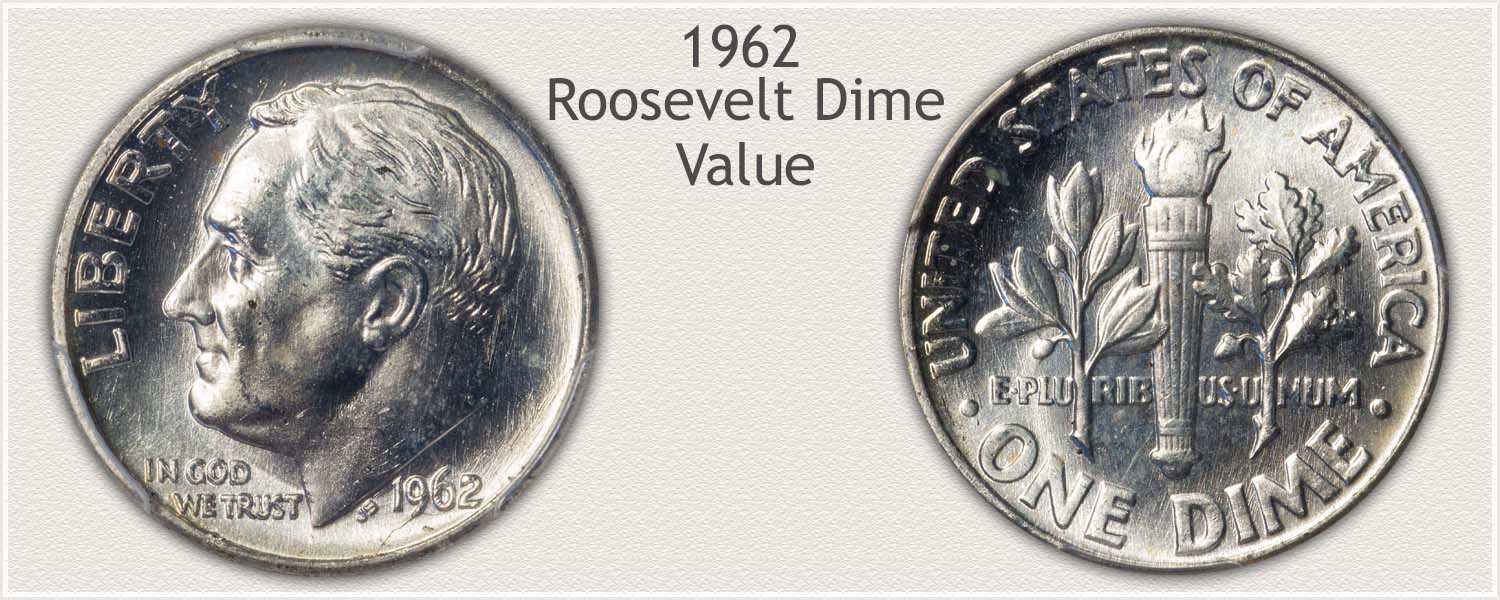
Steps Leading to Value:
- Step 1: Date and Mintmark Variety - Collected by date and mint combination, silver Roosevelt dimes are inspected to confirm both.
- Step 2: Grading Condition - A comparison of your coin with images representing grades determines condition. Charts list these different grades and values.
- Step 3: Special Qualities - Viewing the value chart highlights the need to separate the bullion quality from collector quality. Subtle points on the coin are examined to determine accurately how much a 1962 dime is worth.
| 1962 Dime Value | ||||
|---|---|---|---|---|
| Condition of Coin | ||||
| Date | Good | Fine | Extremely Fine | Mint State |
| Roosevelt Dime Values Updated | 4/14/2025 | |||
| 1962 | $2.13 | $2.13 | $2.13 | $2.63 |
| 1962 D | $2.13 | $2.13 | $2.13 | $2.63 |
With a few steps and a close examination of your coin, narrow the potential for collector premium.
Step 1: | Date and Mintmark Variety Confirmed
Date and Mint Varieties of 1962 Dimes
The early 1960's saw steadily increasing production of silver Roosevelt dimes. 1962 is now recognized as the fourth largest mintage year of the silver era. A typical example, showing wear to the surface, is valued based on its silver content. Collectors first confirm date and mint variety before moving to judging condition.
1962-D Roosevelt Dime
"D" Mintmark on Reverse: Denver Mint Struck the Coin
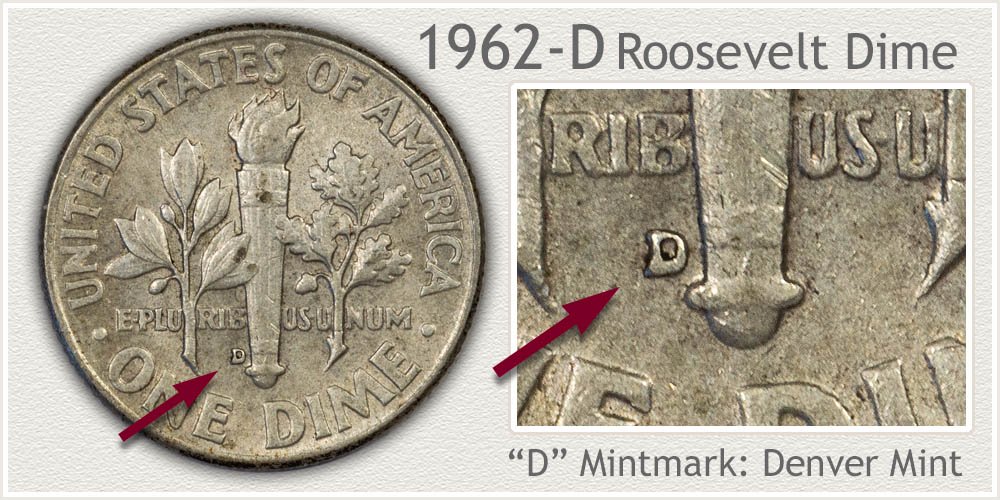
Very large numbers of the Denver mint variety 1962 dimes remain today. Just under 335 million were struck during the year. These coins are a 90% silver alloy and as a result worth well above 10 cents. Currently, worn examples are far too abundant to attract a collector quality premium. Step 2 - Grading is the next important step to finding a higher value.
Denver placed a "D" mintmark on the reverse to identify its production of dimes. Near the base of the torch, on the left side a "D" mark is the Denver variety.
1962 Roosevelt Dime
No Mintmark on Reverse: Philadelphia Mint Struck the Coin
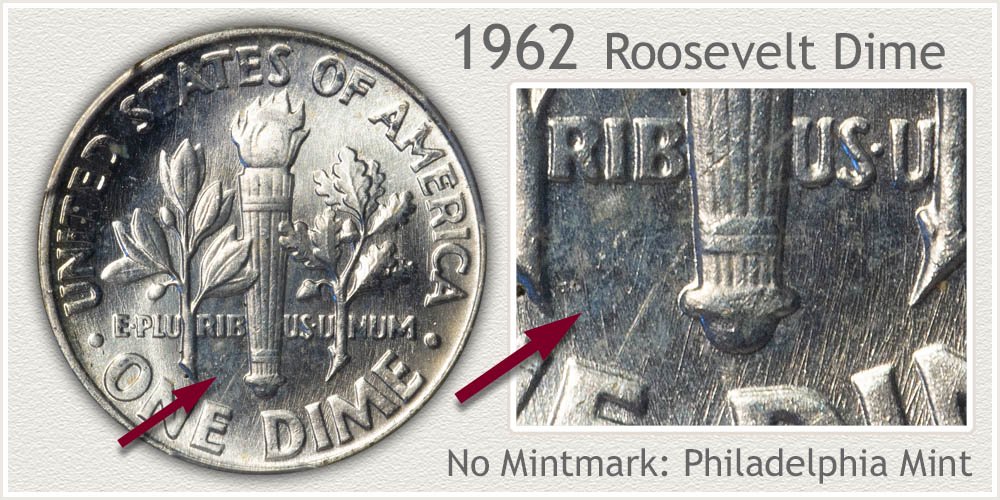
Philadelphia mint struck the second variety of 1962 dimes. The coin is needed to complete a date and mint variety set; however, its condition decides appeal to collectors. Worn examples are very abundant and a large supply in the silver bullion market. Most are valued by silver content. Collectors seek and place premiums on high grade examples. The grading section below highlights the quality sought by collectors.
No mintmark is the determining factor to identify Philadelphia variety 1962 dimes. On the reverse toward the bottom of the torch, no mintmark on the left, is the Philadelphia mint dime.
Step 2: | Condition is Judged and Grade Determined
1962 Dime Value | Recognizing Collector Quality
Popularity and demand from collectors drive premiums in collectible quality 1962 dimes. Identifying a collectible quality examples is done in the grading process and recognizes a coin worth above silver content.
A close inspection of the coin's surface defines its condition into a grade. These grades are used to help place values on the different date and mint varieties. Grades range from coins in Mint State grade - without wear, to those showing heavy wear.
Within the silver era Roosevelt dime series (1946 to 1964) collectible quality is concentrated in the Mint State grade. Images are used during the grading process to compare and find a close match to your coin. Descriptions point to specific areas to focus, judging amounts of wear and confirming grade with the images.
Mint State Grade
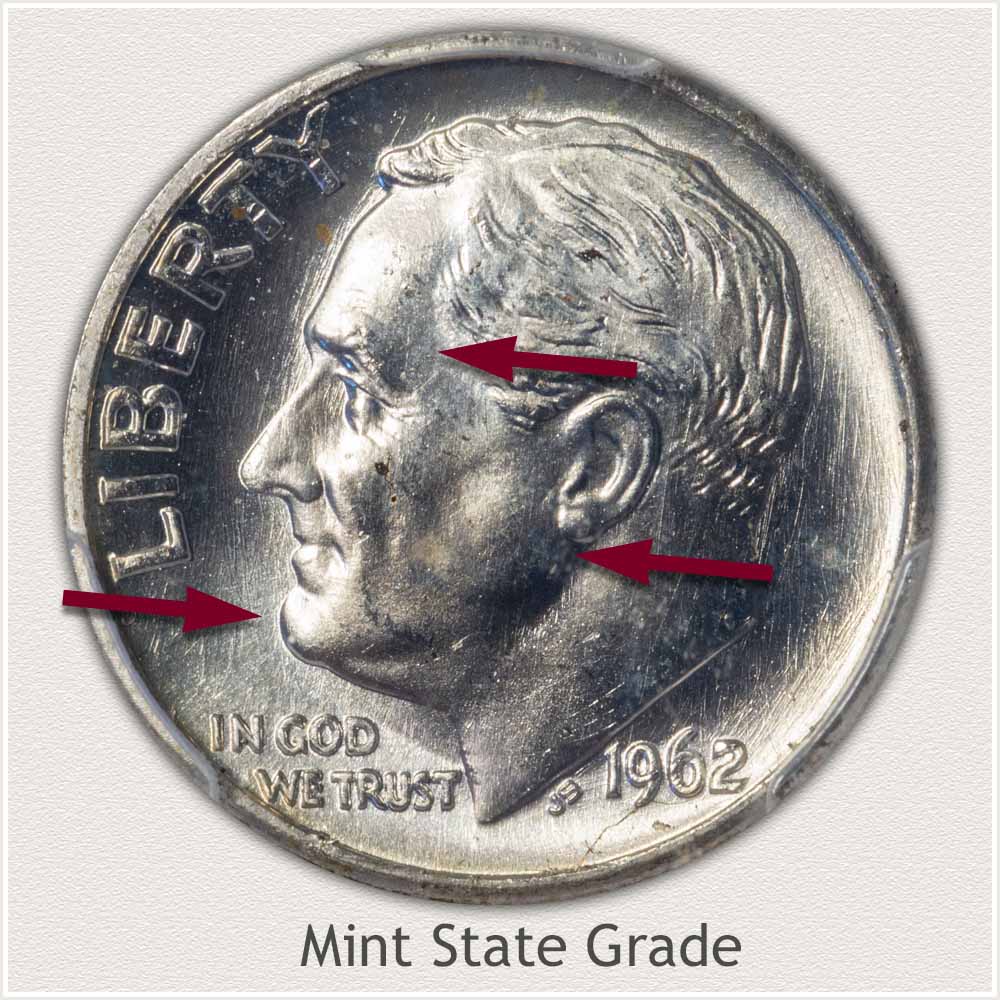
Mint State: A Roosevelt dime with no wear to the surface is the definition of Mint State grade. One of the first features of a coin to show wear is the delicate luster on the surface when first minted. Luster, a fine texture is the "shine" of a coin.
To recognize completeness of luster and no wear; high areas are inspected. Roosevelt's jaw is a large area centrally located and easily worn. Notice the example image remains with no dulling and smoothing of the metal on the jaw from the chin to ear. This area is covered with original luster and is the same texture as the bright areas of the face.
His hair is also fully lustrous with no dull, smooth spots. Tilt your coin under a light, complete luster rolls across the surface with no breaks as the coin is moved.
Extremely Fine Grade
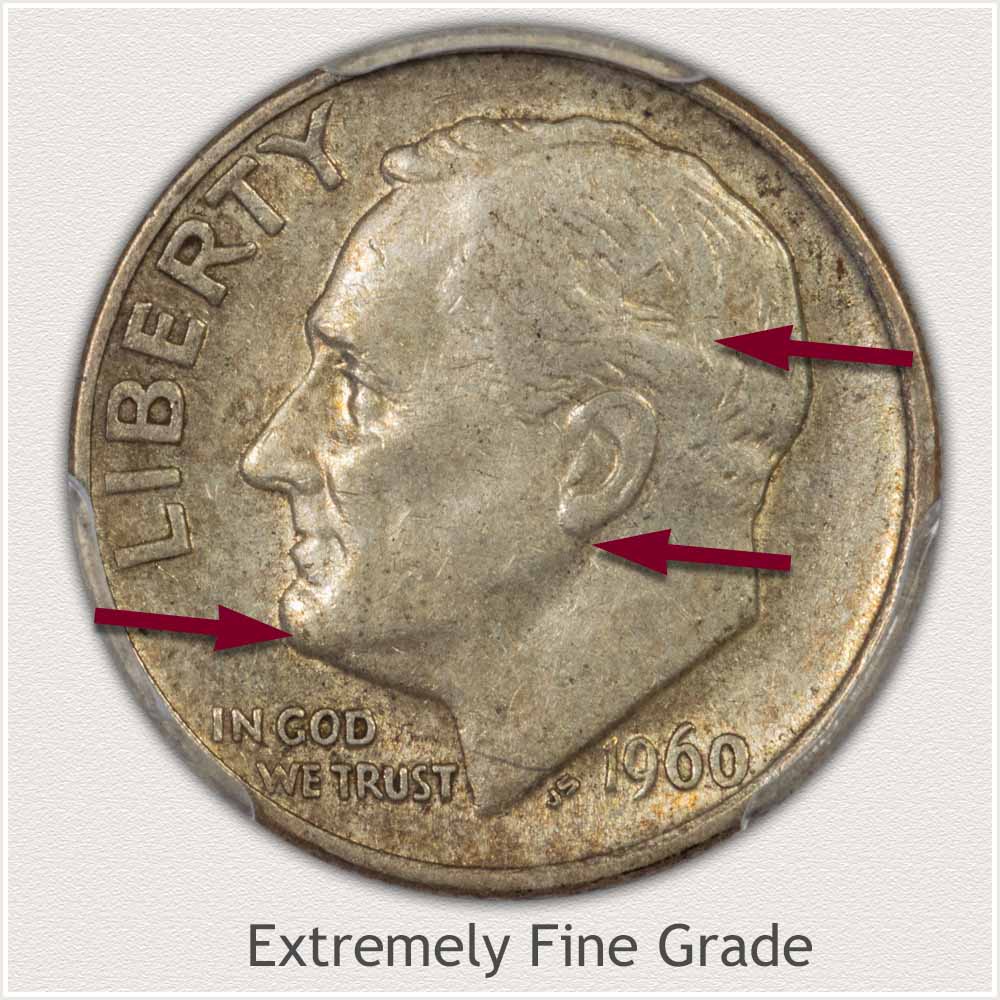
Extremely Fine: Light wear only on high areas defines a dime in Extremely Fine grade. Wear progresses over the surface of a coin and the amount of detail remaining is judged.
The example image shows a slight smooth surface to Roosevelt's jaw. Look closely at the areas from the chin to ear, a color change to the metal is also noted. A once rounded contoured jaw now has a small flat area near the ear. His ear remains well detailed and a low relief area separates the cheek and jaw.
Low Circulated Condition Examples
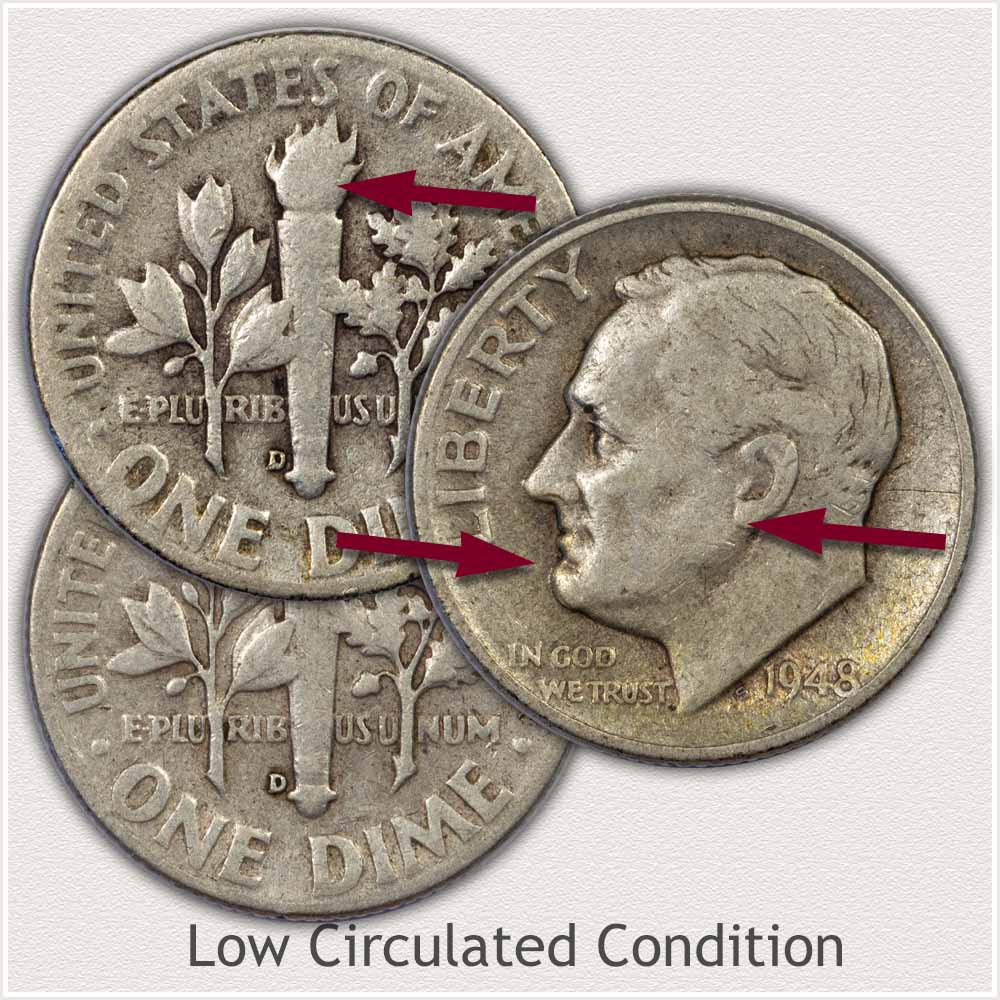
Low Circulated Condition: Noticeable wear begins to lower both the grade and eye appeal of silver Roosevelt dimes. Moderate wear removes fine details, and heavy wear shows as large smooth areas. Low condition coins are below the Extremely Fine grade.
Low condition is recognized by the continuous flat area of Roosevelt's jaw extending from the chin to ear. No roundness to the design of the jaw remains. His ear is becoming flat loosing edge detail. Just under the eye, the cheek is now a flat area and beginning to connect with the flattened jaw.
With few details left in the hair and flattened facial features, eye appeal is lowered. Low condition silver Roosevelt dimes are valued based on silver content.
How to Video: Grading Roosevelt Dimes
Detecting the absence of wear identifies the high quality 1962 dime. On many dimes wear is easy to see. Recognizing subtle points to higher condition is part of grading.
Video, Images and Descriptions | Grading Roosevelt Dimes
Step 3: | Special Qualities Enhancing Value
Collector Insight and Mintage Totals of Silver Era Roosevelt Dimes
Collectors find interest in the numbers of coins produced each year. U.S. Mint Reports are issued yearly with totals of coins struck and amounts each mint coined. These figures are important to alert of an unusually low or high production year. A scarce or common coin in relation to the rest of the series is important information to a collector and often leads to demand and collectability.
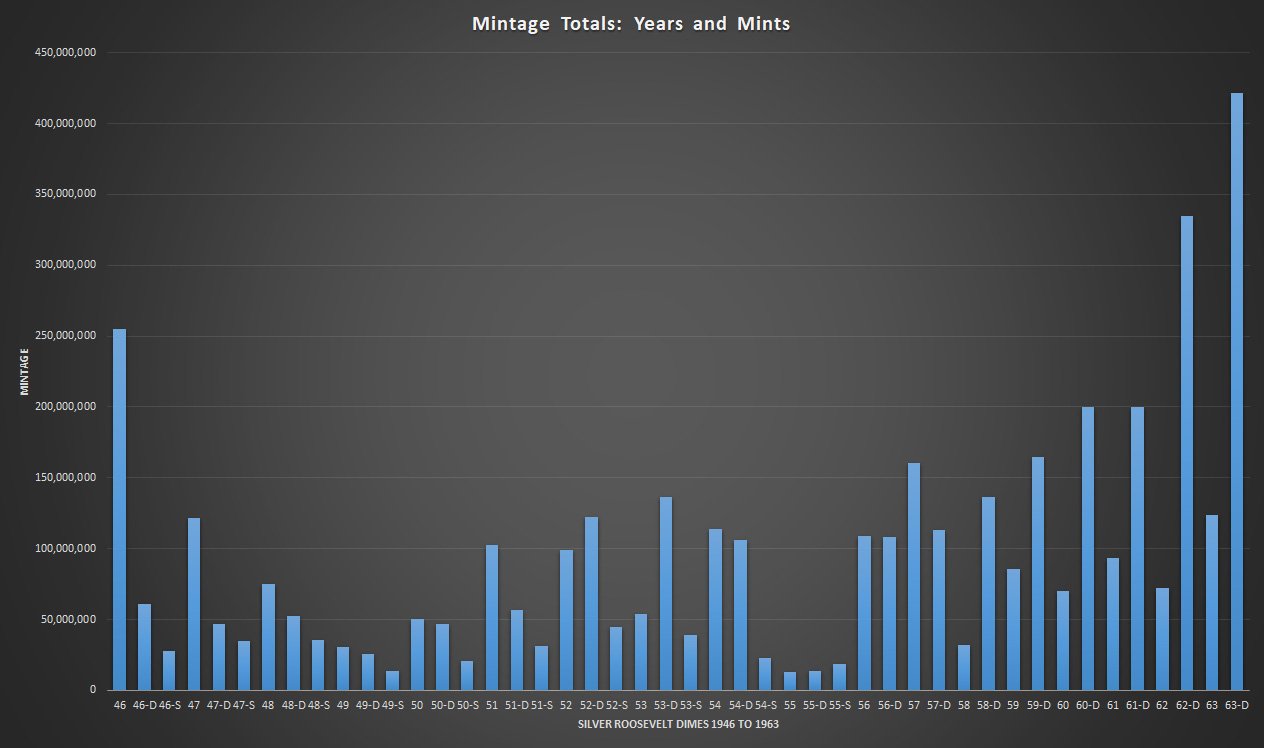
When looking at Chart 1, and spotting the low points, it is noted the majority of San Francisco issues are the least produced for any given year. "S" mint marked Roosevelt dimes are less encountered than other mints giving them a special status within a set of silver era dimes.
Another point of interest is the ending of San Francisco dime mintage in 1955. The main mint Philadelphia and the branch mint Denver contributed dimes each year of the silver era. Interestingly, Denver mint dimes are fewer than Philadelphia dimes in the early years. However, by the late 1950's production at Denver increases and begins to lead in coinage staying far ahead of Philadelphia through 1964.
Each mint has a special low mintage issue. 1955 is the year Philadelphia struck the series record low mintage issue. 1949 the San Francisco mint produced the second lowest issue. In 1955 also, Denver recorded the third lowest mintage dime. These three dime varieties are very low mintages compared to the rest of the series. Record low mintages carry importance to collectors.
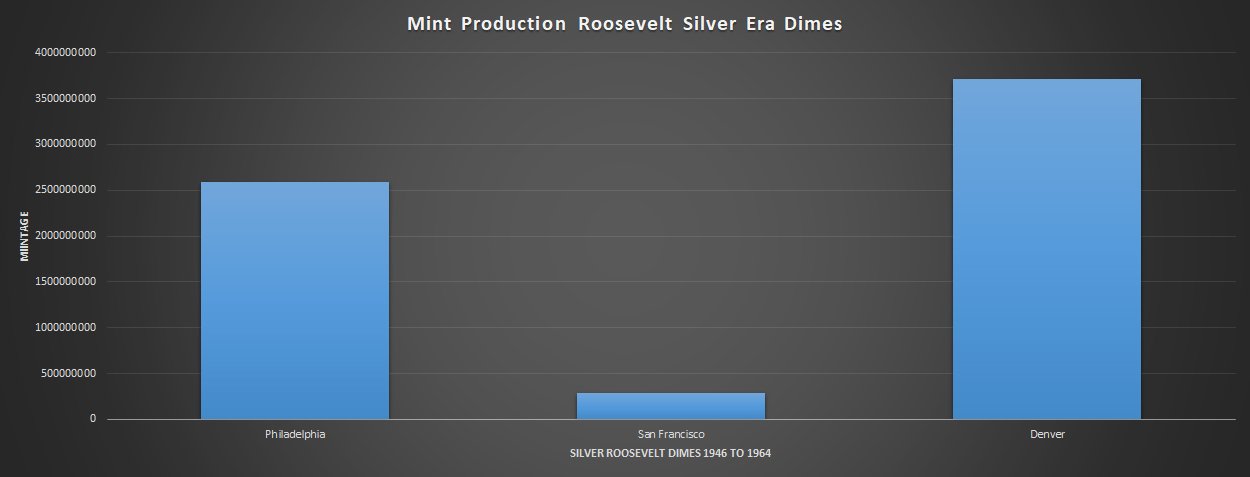
Total dimes struck by the different mints is illustrated in Graph 2. Signaling a potential is the low mintage total of San Francisco in relation to Denver and Philadelphia mints. Of the 6.5 Billion silver era dimes struck just 288.8 Million are of the San Francisco "S" mintmark variety.
Silver era Roosevelt dimes are collected primarily in the mint state grade. Circulated grade silver dimes of the era are mostly valued by their silver content. Mint records show a large difference in numbers stuck among the series giving insight to dates and mints with a potential collector demand. Selective dates and mints with just light circulation wear and of eye appealing quality are an appealing collectible to many.
References
U.S. Mint. 1963 U.S. Mint Annual Report. https://nnp.wustl.edu/library/book/514148
Coin Values | CoinStudy Articles
Date by Date
In Depth Roosevelt Dime Values
1946 to 1964
Roosevelt Dime Values | 1946 to 1964
Collectible status separates the many date and mint varieties of early Roosevelt dime values. Silver is a strong base to the 1946 to 1964 era dimes. Condition identifies the coins collectors place a collector premium on. Chart listing silver Roosevelt dime values highlights the issues worth above silver content and in demand by collectors.
Print the Coin Values Worksheet
List collectible Roosevelt dimes separately by date and mint variety. Add the bullion quality numbers to the list and record their values. Identify and organize your collection, keeping a summary of all coins.
Coin Value Guide | How to Value a Coin Collection
A coin collection is valued using a step-by-step method. Key factors are identified and the coin value guide leads to charts of how much your collection is worth.
Silver Coin Values | Minimum Values of U.S. Silver Coins
Identify silver U.S. coins and find current up to the minute values. Roosevelt dimes 1946 to 1964 are 90% silver and minimum values move up or down with changing silver prices. Enter silver price and calculate dimes, quarters, half and silver dollar premiums.
★Coin Values Discovery finds 1962 Dime Value and...
U.S. coin values determined using a step-by-step process. Begin with identifying the major coin series covering cents to gold coins. Images are used throughout to compare dates, mint varieties, special varieties, and grading condition of your coins. Follow a few steps to narrow range on value charts.
